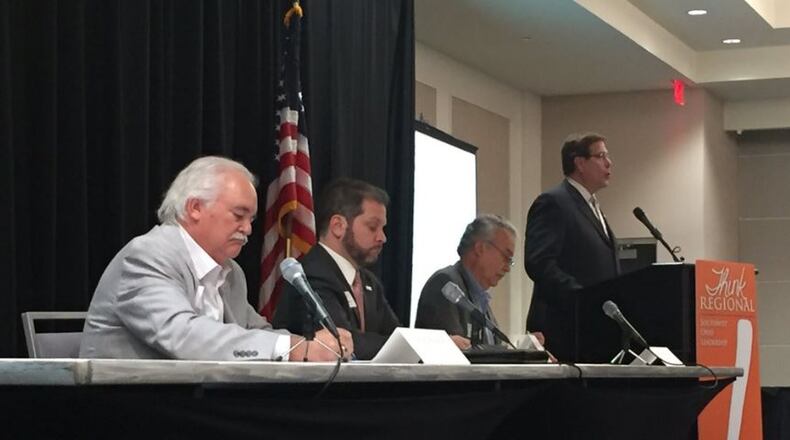In addition, Ohio.gov reports only 4,995 people participated in state retraining programs last year, Hinson said.
“This gap represents a huge commercial and social cost to our area,” he said.
The glut of unfilled jobs in the area comes at a time of “very low” regional unemployment, according to Brendon Cull, chief operating officer of the Cincinnati USA Chamber of Commerce.
“Some economists would say this is as close to full employment as you can get, so that’s a challenge to many communities across the United States, including Cincinnati and Southwest Ohio and Northern Kentucky,” Cull said. “There are people who want different kinds of jobs so we have to understand there are folks who are at a certain level in their own organization but they want to do something different, they want to get a jobs that’s at a higher level and there are companies who need to fill those sorts of roles.”
Cull said his chamber talks to its members “all the time” about growing talent in the region, which he said is “the top strategic priority” for his chamber.
Members’ needs, he said, are as diverse as the chamber’s membership.
“We will talk to one company that is a tech consulting company, that is constantly hiring tech talent and they could literally hire every single graduate from every university in the entire region who graduates with a tech talent degree and that would be enough to fill their number of open positions, and that’s one company,” Cull said. “There is a constant need for tech talent.”
In addition, restaurant owners tell his chamber they are struggling to meet the needs in their kitchens, with a lack of people applying to be short order cooks or line cooks or work in front-of-house operations.
The biggest job growth opportunity that Cincinnati USA Chamber of Commerce is seeing in the region, Cull said, is the Amazon facility slated to be built near the Cincinnati/Northern Kentucky International Airport.
“Three thousand jobs on a good day,” he said. “I think that’s going to be much, much bigger than that and that’s phenomenal for the region.”
In tougher economic times, employers seemed content asking for anyone to fill openings in the workforces, said Phillip Parker, president and CEO of the Dayton Chamber of Commerce.
“I think that there’s a lot more dynamic to that now,” Parker said. “I think the employer has a lot greater expectation of the … education community.”
However, “education to the business community is a means to an end,” he said. Employers, first and foremost, need a skilled, trained and ready workforce.
“That might mean anything to employers. Everything from soft skills to some specific technical skills,” Parker said.
Alfonso Cornejo, president of the Cincinnati Hispanic Chamber of Commerce, said many companies are looking to establish themselves in the region by operating 24 hours a day, seven days a week, but they have difficulty finding workers.
Cornejo said he gets calls almost every day from company officials asking for dozens of new Hispanic employees.
“Why?” he said. “Because they’re the only ones who show up for work.”
That’s because millennials don’t want to work 24 hours and they don’t want to work seven days a week, he said. But Hispanics are only 3.1 percent of the population in region, which he said is “extremely low” and one of the lowest percentages in any metropolitan area nationwide.
The problem is not the shortage of people with light manufacturing skills, as so much it is a problem with people’s attitudes, Cornejo said.
Millennials, he said, do not want to be controlled by machines.
“We are short on people and unless we do something … those light manufacturing jobs are going to start dwindling down because people cannot pay for those investments and they’ll go somewhere else,” Cornejo said.
Cull said what members are telling his chamber is that they must source from universities and develop great partnerships with technical and training schools in the region, but must also source from outside the region.
Download the free Journal-News app for the latest local business news
About the Author

